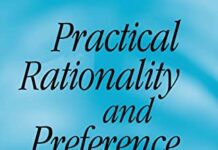
Ebook Info
- Published: 1998
- Number of pages: 316 pages
- Format: PDF
- File Size: 12.99 MB
- Authors: Christopher W. Morris
Description
This important book is the first serious philosophical examination of the modern state. It inquires into the justification of this particular form of political society. It asks whether all states are “nation-states,” what are the alternative ways of organizing society, and which conditions make a state legitimate. The author concludes that, while states can be legitimate, they typically fail to have the powers (e.g. sovereignity) that they claim. Christopher Morris has written a book that will command the attention of political philosophers, political scientists, legal theorists, and specialists in international relations.
User’s Reviews
Editorial Reviews: Review “Morris…offers a refreshing…return to the tradition of political analysis that focused on the nature of the state rather than on the institutions of government and the political process. Upper-division undergraduates, graduate students, and faculty.” Choice”…Morris’s book os an excellent illustration…Morris’s approach not only brings contemporary preoccupations into closer contact with those of classical political philosophy, it also nicely shows just how the projects of mainstream contemporary political philosophy are related to those of more radical and revisionist theory. An Essay is a very good book, and anyone interested in political and legal philsophy should find much in the book to engage those interests. It is throughout exceptionally clear and careful, accessible to readers at various levels of sophistication while still responsive to the best recent work on its topics, and full of interesting and persuasive argument.” The Philosophical Review”Christopher W. Morris’s An Essay on the Modern State is a wide-ranging and highly provocative exploration of the nature and supposed justifications of the modern state.” Eric Mack, Tulane University Book Description This important book is the first serious philosophical examination of the modern state.
Reviews from Amazon users which were colected at the time this book was published on the website:
⭐From the beginning Morris states his thesis which is that while modern states can be legitimate, they fail to have all the powers they claim. First he goes about by spending several chapters figuring out what a state is and providing a loose definition for it. He then spend the rest of the book exploring the legitimacy and extent of state powers and claims. Virtually every landmass is the territory of a state, territoriality being a defining characteristic of modern states. States combine the strengths of empire (large, powerful) with those of the city-republic (large proportion of people concerned about political processes). Because of their great strengths, states are well suited to provide social order and other public goods, yet are also capable of great atrocities when their power is unrestrained (e.g.: holocaust). These traits lead Morris to characterized the modern state like this:Continuity in time and space (survives changes in leadership and holds territory)Transcendence (above government, bureaucracy, etc. these are the states agents)Political organization (rule is direct and territorial)Authority (state is ultimate sovereign)Allegiance (expects and receives loyalty, above all other relationships e.g.; family, clan, religion, from all who are members) There are many other alternatives to the modern state including, loose/centralized empires, feudalism, the polis, decentralized intensive trading networks, theocratic federations, city-republics, anarchy, etc. Morris chooses primarily to focus on anarchy as an alternative. Anarchists believe that social order is possible without state intervention. This, of course, assumes some kind of security which could be provided by private security enforcement contracts. This becomes problematic for two reasons. One, because security is a collective good, a `free-rider’ issue emerges, it is difficult, or even too costly to deny security benefits to those who do not pay in (which as state could force). Secondly, the nature of security firms (their power of force) makes customers venerable and can lead to a monopoly. In the end, we can only expect a minimum amount of collective good to be produced voluntarily (or in anarchy). What exactly makes a state legitimate? Morris claims firstly that it must be justified, which seems to largely mean that there are reasons to endorse the state for all or most people. This seems to lead to the state providing some form of justice, which means to respect and protect the semi-natural (after convention, but before states) individual rights to life, liberty, and property. A state must also do this at least with minimal efficiency in order to be legitimate. Next, Morris addresses the issue of sovereignty, which he defines as internal (exclusive power in the territory) and external (independence from outside states). Hobbes and Rousseau both saw this issue as well, and esteem what is called classical sovereignty, which is that the sovereign is the ultimate source of political authority within a realm. Classical sovereignty possesses three qualitiesAbsoluteness (unconstrained or unlimited)inalenableness (cannot be delegated or represented)indivisibility (is unique and cannot be divided)Morris argues that this Hobbesian claim assumes that powers are transitive and comparable, and does not establish that we need or want am absolute monarch (or any sort of classical sovereign). States in practice are believed to be morally constrained by our rights and their duties (though states claim they are limited only by what they recognize). In the end, states are not classically sovereign. States are not even limitedly sovereign. If they were, that would imply that all state directives are authoritative (e.g. the preemptive reason to act). Only a being with God’s competence and benevolence could command such authority. Thus states authority is more restricted than they recognize or admit. Morris thus concludes that states are not sovereign, and need not be. Sovereignty is not a prerequisite for social order, “political power is fluid and political life is a result of compromise and accommodation.” The next issue is that of boundaries, how are they to be defined? The idea is that boundaries are to encompass a people and their lands. A people is often equated with a nation which Morris defines as “a collection of individuals with common histories, cultures, languages, and the like. Members of which recognize other members by virtue of these attributes.” This seems a permissible theory, however, most modern societies are now irretrievably multi-national or multi-cultural (e.g. Switzerland, U.S.A.). It is also difficult to define boundaries in terms of ownership, as a state’s authority is a jurisdictional relation. The final analysis is mostly a critical one. Morris discusses the various issues, unique and otherwise, concerning the modern state and various theories surrounding those issues. He takes a mostly skeptical stance on most common theories and essentially concludes that it is difficult to define the aspects of the modern state, and that our conception of the state (and the state’s conception of itself) lends more power and legitimacy to it than it actually has. I find that since the purpose Morris had throughout the book was merely to explore the unique issues surrounding the modern state, and not necessarily provide any solutions to them, his arguments were strong and difficult to refute, especially since he would often adhere to a view that it was really too complicated to have any real consensus on any of the issues discussed (which could be considered a weakness). In the end, I found Morris’ essay to be informative and difficult to refute.
Keywords
Free Download An Essay on the Modern State in PDF format
An Essay on the Modern State PDF Free Download
Download An Essay on the Modern State 1998 PDF Free
An Essay on the Modern State 1998 PDF Free Download
Download An Essay on the Modern State PDF
Free Download Ebook An Essay on the Modern State

